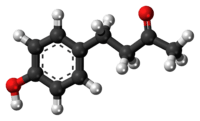Raspberry ketone
 | |
 | |
| Names | |
|---|---|
| IUPAC name
4-(4-Hydroxyphenyl)butan-2-one | |
| Other names
p-Hydroxybenzyl acetone; 4-(p-Hydroxyphenyl)-2-butanone; Frambinone; Oxyphenylon; Rheosmin; Rasketone | |
| Identifiers | |
| 5471-51-2 | |
| 3D model (Jmol) | Interactive image |
| Abbreviations | RK |
| ChEBI | CHEBI:68656 |
| ChEMBL | ChEMBL105912 |
| ChemSpider | 20347 |
| ECHA InfoCard | 100.024.370 |
| EC Number | 226-806-4 |
| PubChem | 21648 |
| UNII | 7QY1MH15BG |
| |
| |
| Properties | |
| C10H12O2 | |
| Molar mass | 164.20 g·mol−1 |
| Appearance | White needles[2] |
| Melting point | 82 to 84 °C (180 to 183 °F; 355 to 357 K) |
| Boiling point | 140 to 146 °C (284 to 295 °F; 413 to 419 K) at 0.5 mmHg |
| Hazards | |
| R-phrases | R22 |
| Except where otherwise noted, data are given for materials in their standard state (at 25 °C [77 °F], 100 kPa). | |
| | |
| Infobox references | |
Raspberry ketone is a natural phenolic compound that is the primary aroma compound of red raspberries.
Occurrence
Raspberry ketone occurs in a variety of fruits including raspberries, cranberries and blackberries.[3] It is biosynthesized from coumaroyl-CoA.[4] Extraction of pure raspberry ketone is usually 1–4 mg per kg of raspberries.[5]
Preparation
Since the natural abundance of raspberry ketone is very low, it is prepared industrially by a variety of methods from chemical intermediates.[6] One of the ways this can be done is through a crossed aldol-catalytic hydrogenation. In acetone and sodium hydroxide, 4-hydroxybenzaldehyde can form the α,β-unsaturated ketone. This then goes through catalytic hydrogenation to produce raspberry ketone. This method produces a 99% yield.[7]
Uses
Raspberry ketone is used in perfumery, in cosmetics, and as a food additive to impart a fruity odor. It is one of the most expensive natural flavor components used in the food industry. The natural compound can cost as much as $20,000 per kg.[5] Synthetic raspberry ketone is cheaper, with estimates ranging from a couple of dollars per pound[8] to one fifth of the cost of natural product.[9]
Putative health effects
Although products containing this compound are marketed for weight loss, there is no clinical evidence for this effect in humans.[10] The average daily intake of dietary raspberry ketone has been estimated as 0.42 mg/kg/day.[11] Early studies in rats looking into the potential toxicity of raspberry ketone found no effects on the body weight of rats with doses up to 100 mg/kg, 238 times greater than the estimated intake for humans or 0.01% of body weight.[11] A more recent study demonstrated that when mice were fed very high doses of raspberry ketone, 2% of their diet by weight, there was a statistically significant prevention of high-fat-diet-induced elevation in body weight.[12] The high dose effect is reported to stem from the alteration of lipid metabolism, increasing norepinephrine-induced lipolysis and fatty acid oxidation in cultured adipocytes.[13]
Nutritional supplement manufacturer Andrew Lessman criticized and countered sensationalized media and marketing claims about raspberry ketone’s purported weight-loss benefits and strongly cautioned against its use.[14]
Safety
Little is known about the long term safety of raspberry ketone supplements.[15][16] Because it is chemically related to the stimulant synephrine, there are some concerns about its safety.[10] Toxicological models indicate a potential for cardiotoxic effects as well as effects on reproduction and development.[15]
In 1965, the US Food and Drug Administration classified raspberry ketone as generally recognized as safe (GRAS) for the small quantities used to flavor foods.[2] In the UK, raspberry ketone supplements are on the Food Standards Agency's unauthorized list.[17]
See also
References
- ↑ Catalog of Organics and Fine Chemicals, Acros Organics, 2004/05, page 1250.
- 1 2 "4-(p-Hydroxyphenyl)-2-butanone". Food and Cosmetics Toxicology. 16: 781–2. 1978. doi:10.1016/S0015-6264(78)80113-8.
- ↑ Raspberry Ketone, Molecule of the Month, University of Bristol
- ↑ "MetaCyc Pathway: raspberry ketone biosynthesis". MetaCyc. Retrieved 2012-07-12.
- 1 2 Beekwilder, Jules; Van Der Meer, Ingrid M.; Sibbesen, Ole; Broekgaarden, Mans; Qvist, Ingmar; Mikkelsen, Joern D.; Hall, Robert D. (2007). "Microbial production of natural raspberry ketone". Biotechnology Journal. 2 (10): 1270–9. doi:10.1002/biot.200700076. PMID 17722151.
- ↑ Tateiwa, Jun-Ichi; Horiuchi, Hiroki; Hashimoto, Keiji; Yamauchi, Takayoshi; Uemura, Sakae (1994). "Cation-Exchanged Montmorillonite-Catalyzed Facile Friedel-Crafts Alkylation of Hydroxy and Methoxy Aromatics with 4-Hydroxybutan-2-one to Produce Raspberry Ketone and Some Pharmaceutically Active Compounds". The Journal of Organic Chemistry. 59 (20): 5901–4. doi:10.1021/jo00099a017.
- ↑ Smith, Leverett R. (1996). "Rheosmin ('Raspberry Ketone') and Zingerone, and Their Preparation by Crossed Aldol-Catalytic Hydrogenation Sequences". The Chemical Educator. 1 (3): 1–18. doi:10.1007/s00897960034a.
- ↑ http://www.wordsonwellness.com/post/2012/06/13/With-All-Due-Respect-to-Dr-Oz-Raspberry-Ketone-is-not-a-Fat-Burning-Miracle.aspx
- ↑ Why no Raspberry Ketones at NOW Foods?, The Herbal Insider, accessed 2013-03-15
- 1 2 "Raspberry Ketone". WebMD.
- 1 2 Gaunt, I.F.; Sharratt, M.; Colley, J.; Lansdown, A.B.G.; Grasso, P. (1970). "Acute and short-term toxicity of p-hydroxybenzyl acetone in rats". Food and Cosmetics Toxicology. 8 (4): 349–58. doi:10.1016/S0015-6264(70)80388-1. PMID 5489397.
- ↑ Morimoto, Chie; Satoh, Yurie; Hara, Mariko; Inoue, Shintaro; Tsujita, Takahiro; Okuda, Hiromichi (2005). "Anti-obese action of raspberry ketone". Life Sciences. 77 (2): 194–204. doi:10.1016/j.lfs.2004.12.029. PMID 15862604.
- ↑ Park, Kyoung (2010). "Raspberry Ketone Increases Both Lipolysis and Fatty Acid Oxidation in 3T3-L1 Adipocytes". Planta Medica. 76 (15): 1654–8. doi:10.1055/s-0030-1249860. PMID 20425690.
- ↑ "Raspberry Ketone is not a Fat-Burning Miracle". Words On Wellness. 2012-06-13. Retrieved 2012-010-17. Check date values in:
|access-date=(help) - 1 2 Bredsdorff L, Wedebye EB, Nikolov NG, Hallas-Møller T, Pilegaard K (2015). "Raspberry ketone in food supplements - High intake, few toxicity data - A cause for safety concern?". Regul Toxicol Pharmacol. 73 (1): 196–200. doi:10.1016/j.yrtph.2015.06.022.
- ↑ Cathy Wong. "Raspberry Ketones for Weight Loss". About.com.
- ↑ FSA. "Unauthorised novel foods". food.gov.uk.